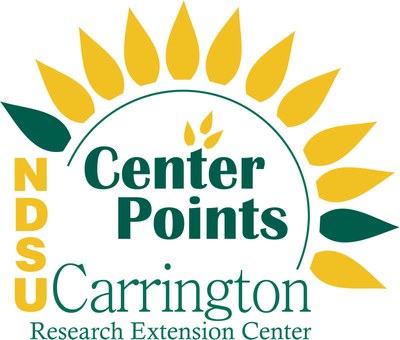2019
New Seed Conditioning Facility Begins Operation
In October of 2018, the Carrington Research Extension Center commenced operation of a new seed plant for cleaning and conditioning foundation-grade seedstocks produced by the CREC. The new seed plant replaces the original seed cleaning facility that was constructed in 1963. The foundation seed program of the CREC is part of the overall NDSU Foundation Seedstocks project. The overall project includes seed production and conditioning capabilities at the Agronomy Seed Farm and four Research Extension Centers. The CREC foundation seedstocks program produces and processes a large volume and diverse number of crops and crop varieties annually. In recent years, the program has conditioned 50,000 to 60,000 bushels of seed representing 27 to 35 different varieties among 8 to 12 different crops. Like all stages of foundation seed production, the plant is designed to facilitate the complete clean out of all seeds from all components before the next seedlot is processed. Foundation grade seed is highly pure seed that serves as parent seed for seedsman who wish to grow and sell certified seed as Registered or Certified class. The foundation grade seed produced and conditioned by the CREC is in demand by many constituencies ranging from the large commercial private seedsman of the state to individual farmers and emerging small business interests. In the past five years, the CREC has provided foundation seed to more than 325 different constituents.
The near completion of the new seed plant represents the culmination of more than ten years of effort to secure support for construction of this facility. The State Board of Agricultural Research and Education had ranked new seed cleaning plants at a number of locations among their capital project priorities for multiple legislative sessions. The 64th Legislative Assembly (2015 session) approved $750,000 from general funds and authorized up to $1.5 million from other funds for construction of seed cleaning plants at the Carrington Research Extension Center and the North Central Research Extension Center at Minot. In May of 2016, the SBHE authorized NDSU to proceed with the construction of a seed cleaning facility located at the Carrington REC utilizing the $750,000 from the state general fund and other funds.
The original plant has the basic capacity to process most crops at a rate of 30 bushels per hour. The cleaning equipment and components of seed transfer and distribution in the old plant were spread across five floors that presented worker safety challenges along with minimal capacity for dust control. The new plant is equipped to clean and condition seed at a rate of 300 bushels per hour across equipment aligned on a platform above ground level. The new facility incorporates worker safety features including effective dust control measures with a bag dust system. A programmable logic controller allows automation in start-up and adjustments among the many components of the seed processing line.
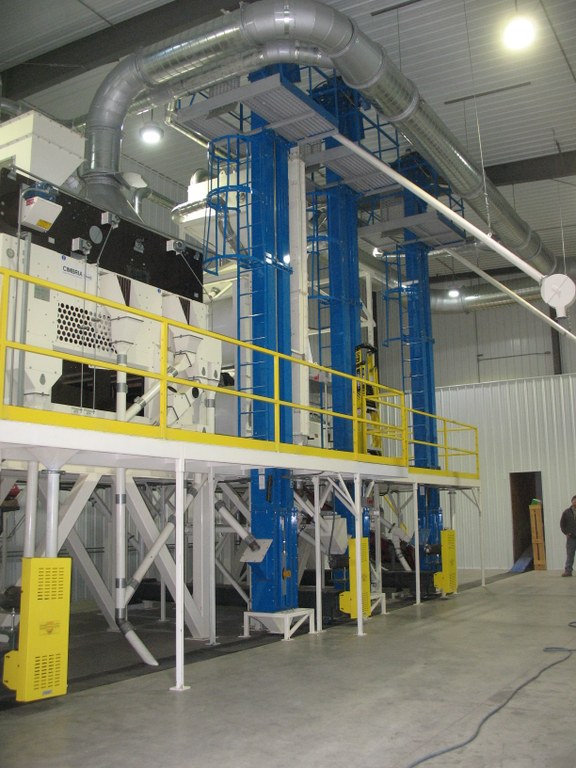
Inside view of the new seed plant at the CREC.
The new seed plant has been built in multiple phases, with each phase initiated as funds were available through the general fund appropriation, fund raising efforts and internal resources. Construction of the new seed plant began in the fall of 2016 with construction of the main building. In early 2017, the primary seed cleaning equipment was purchased and additional phases of construction have followed through the completion of the most recent phase that was installation of the dust control system early October. The foundation seed plant when fully complete will be capable of implementing five stages of seed conditioning depending upon the needs of the seedlot. The various processing stages in order are a vibratory pre-cleaner, air screen, indent separator, gravity table, and optical sorter. The first four stages are now fully operational and are being used to condition the 2018 production. The important capabilities provided by an optical sorter are not yet a component of the plants processing sequence. This equipment and its ancillary features will be installed in the future when adequate resources are available.
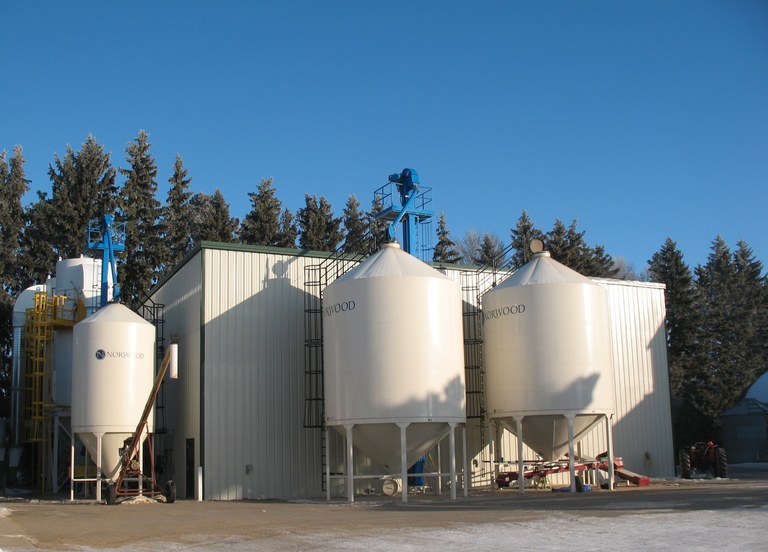
Current outside view of the new seed plant at the CREC.
Blaine Schatz
blaine.schatz@ndsu.edu
CREC Director and Agronomist
North American Manure Expo…What’s in a NAME?
North Dakota State University Extension had the honor of co-hosting the 2018 North American Manure Expo (NAME) on August 15-16 in Brookings, South Dakota. NDSU Extension co-hosted NAME with South Dakota State University, University of Minnesota, University of Nebraska – Lincoln and Iowa State University.
NAME was launched in 2001 in Wisconsin by (what eventually became) the Professional Nutrient Applicators Association of Wisconsin and the University of Wisconsin Extension Nutrient Management Team. The event was put together at the request of custom manure applicators who wanted to see similar equipment go head-to-head with their competitors. The event has evolved to include three main attractions: an industry trade show, manure technology demonstrations and educational seminars and demonstrations.
NAME is an annual, international event that is hosted in a new location each year. It has been hosted in Wisconsin, Michigan, Minnesota, Missouri, Ohio, Iowa, Nebraska, and Pennsylvania and now South Dakota in the US and Guelph, Ontario, Canada. There were 1,300 people in attendance this year over the two-day event with demographics spanning 8 countries including the United States, Canada, England, Belgium, China, the Netherlands, Australia, and New Zealand.
Day one includes tours and agitation demonstrations while day two focuses on educational seminars, the trade show and spreader demonstrations. NDSU Extension had the opportunity to chair the educational seminar committee. Two hundred ninety-two people attended the educational seminars! The educational seminars provide a chance to share the latest information regarding technology and equipment, manure-related research, as well as treatment options and management practices that continue to evolve. Preliminary results from a follow-up survey of NAME attendees shows that 87% of 141 respondents either agreed or strongly agreed that attending the 2018 NAME made them more aware of how manure impacts soil health. The educational seminar committee considers this a success as several of the topics presented pertained to the use of manure as a fertilizer and its effects on soil health and the environment. Furthermore, 86% of 136 respondents have used what they learned during NAME to do their job better and 88% of 137 respondents said they have shared knowledge they gained with others after NAME, meaning the education and resources are reaching far more than just on-site attendees.
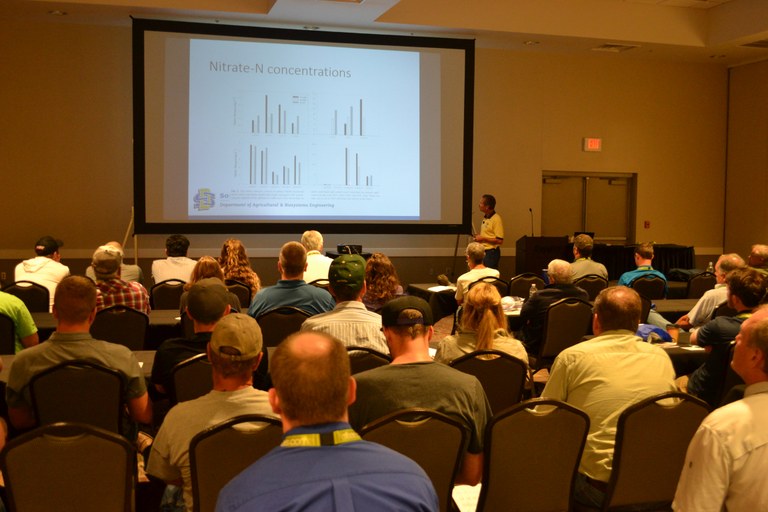 North American Manure Expo attendees participating in the educational seminars.
North American Manure Expo attendees participating in the educational seminars.
Photo courtesy of Robert Meinen, Pennsylvania State University
Professional manure applicators are not the only ones who attend NAME. The list also includes: dairy, livestock and poultry producers; handlers of both liquid and solid manures; crop consultants and nutrient management specialists; compost managers; custom operators; agricultural support industry; Extension and Government agency personnel.
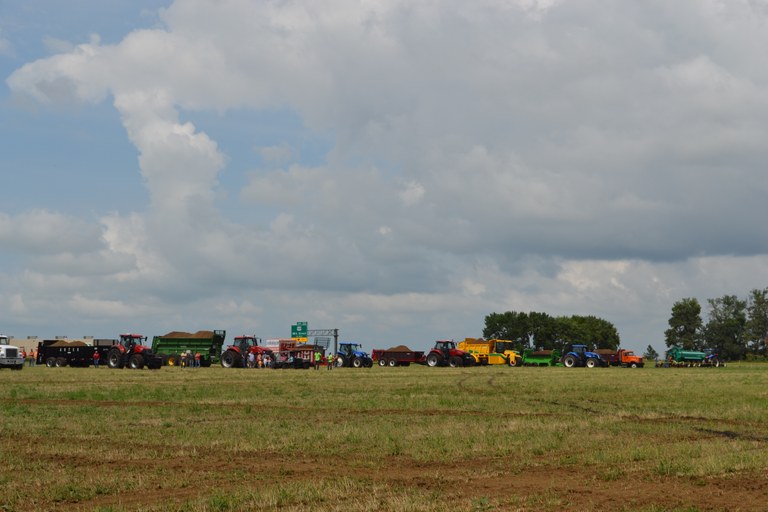 Spreaders lined up and ready for demonstrations during the North American Manure Expo.
Spreaders lined up and ready for demonstrations during the North American Manure Expo.
Photo courtesy of Robert Meinen, Pennsylvania State University
Comments from attendees included:
- “Keep up the great work. The show continues to be on the cutting edge of technology year after year. Thank you!” – NAME attendee
- “Speakers were diverse. Good job keeping topics and schedule moving. There were six in my group, so we split up, to take almost all of them [educational seminars] in. I know my employees got a lot out of attending as well.” – NAME attendee
The 2019 North American Manure Expo will be held in Fair Oaks, Indiana on July 31 and August 1. More information can be found at www.manureexpo.org.
Mary Keena
Mary.Keena@ndsu.edu
Extension Specialist
Intentional

“If you think you can, you can. If you think you can’t, you’re right.” This quote is credited to Henry Ford but I’ve heard it said by many over the last couple years. As I put away my Christmas things on New Year’s Day this quote kept running through my mind. It is a challenge to our mindset. Are we going into a task/project/season with an “I got this” attitude or are we going into it thinking we’re already doomed? The latter thought seems to be the default for most of us, including me. Personally, my husband and I have 1000 dreams we’d like to see come to fruition over the next 60 years and though we work each week toward our 1, 5 and 10 year plans it seems we get nowhere! Ten whole years is a lifetime away. Alas, we will have to wait. In the meantime, and with a positive attitude, we can do the small, daily tasks that will add up to monumental change in the year(s) to come.
You, too, can have a positive attitude and outlook even when the markets are down, the weather is crummy, the cows are out and your partner is sick. How? Intentionally. You have to intentionally choose the positive. Every single day, sometimes multiple times a day. Intentional means done on purpose or deliberate. You have to deliberately choose to make the best of all situations. You have to control only what’s controllable and let the rest be. Are you caught in a bad financial situation, fighting with your partner, or wondering how the farm transition thing is going to work? What are simple, small, intentional steps you can take consistently, every day, to start working in the right direction? Although you can reset any time during the year, January offers a nice, clean slate.
I challenge you to start 2019 with a positive (and realistic) mindset. Intentionally choose to see the opportunities when challenges arise. Remember, if you think you can, you can. If you think you can’t, you’re right.
This publication offers some wellness tools you can use during times of farm stress.
Mary Keena
mary.keena@ndsu.edu
Extension Specialist

